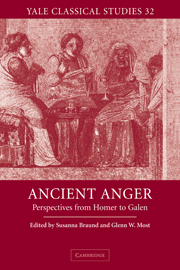Book contents
- Frontmatter
- Contents
- Notes on contributors
- Acknowledgments
- List of abbreviations
- Introduction
- Chapter 1 Ethics, ethology, terminology: Iliadic anger and the cross-cultural study of emotion
- Chapter 2 Anger and pity in Homer's Iliad
- Chapter 3 Angry bees, wasps, and jurors: the symbolic politics of ὀργή in Athens
- Chapter 4 Aristotle on anger and the emotions: the strategies of status
- Chapter 5 The rage of women
- Chapter 6 Thumos as masculine ideal and social pathology in ancient Greek magical spells
- Chapter 7 Anger and gender in Chariton's Chaereas and Callirhoe
- Chapter 8 “Your mother nursed you with bile”: anger in babies and small children
- Chapter 9 Reactive and objective attitudes: anger in Virgil's Aeneid and Hellenistic philosophy
- Chapter 10 The angry poet and the angry gods: problems of theodicy in Lucan's epic of defeat
- Chapter 11 An ABC of epic ira: anger, beasts, and cannibalism
- References
- Index of passages cited
- Index of proper names
- Index of topics
Chapter 6 - Thumos as masculine ideal and social pathology in ancient Greek magical spells
Published online by Cambridge University Press: 22 September 2009
- Frontmatter
- Contents
- Notes on contributors
- Acknowledgments
- List of abbreviations
- Introduction
- Chapter 1 Ethics, ethology, terminology: Iliadic anger and the cross-cultural study of emotion
- Chapter 2 Anger and pity in Homer's Iliad
- Chapter 3 Angry bees, wasps, and jurors: the symbolic politics of ὀργή in Athens
- Chapter 4 Aristotle on anger and the emotions: the strategies of status
- Chapter 5 The rage of women
- Chapter 6 Thumos as masculine ideal and social pathology in ancient Greek magical spells
- Chapter 7 Anger and gender in Chariton's Chaereas and Callirhoe
- Chapter 8 “Your mother nursed you with bile”: anger in babies and small children
- Chapter 9 Reactive and objective attitudes: anger in Virgil's Aeneid and Hellenistic philosophy
- Chapter 10 The angry poet and the angry gods: problems of theodicy in Lucan's epic of defeat
- Chapter 11 An ABC of epic ira: anger, beasts, and cannibalism
- References
- Index of passages cited
- Index of proper names
- Index of topics
Summary
Among the Greek magical handbooks of the Roman period we find several charms labeled thumokatocha – a rubric usually translated as “spells for restraining anger” despite the notoriously broad semantic range of the word thumos, which in addition to “anger” can among other things mean “breath,” “soul,” “spirit,” “will,” “courage,” “heart,” or “life.” These handbook charms seem to originate from two very different magical traditions, one connected with cursing or “black magic” and the other with amulets or “white magic.” Thus those inscribed on lead and deposited in bodies of water or graves clearly evolve from a native Greek tradition of spells that aim at binding the body, the speech, or the mental faculties of a rival or an enemy. A second and equally popular type of Greek thumos-restraining spell probably originates in Near Eastern traditions and involves wearing amulets – either knotted cords or inscribed gold or silver tablets – designed to enhance the charisma of the wearer and to ward off the anger and hostility of others, usually their social superiors. As we shall see, both types of spells aim at much more than a man's anger. In this essay, then, I question and ultimately reject the very narrow definition of thumokatocha as “anger-restraining spells,” first by surveying the extant examples of both types of charms and then by briefly discussing a third and closely related category of love potions that seem similarly designed to mollify or soothe irritated males.
- Type
- Chapter
- Information
- Ancient AngerPerspectives from Homer to Galen, pp. 144 - 162Publisher: Cambridge University PressPrint publication year: 2004
- 1
- Cited by



